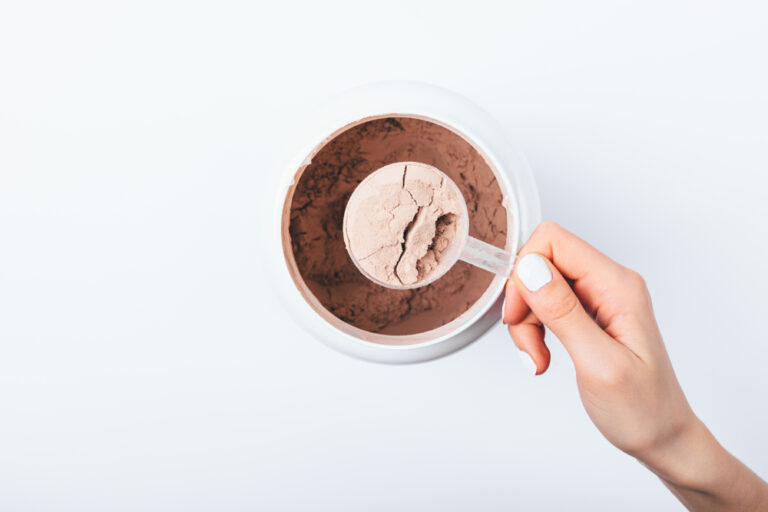Does Creatine Make You Gain Weight?
We include links to products that we think our readers will find useful. If you buy through links on this page, we may earn a small commission. Learn about our process.
Creatine is a popular sports supplement that has been shown to increase muscle size, strength, and power.
Although creatine is safe with minimal side effects, some believe taking it can make you gain weight and feel bloated.
This article discusses everything you need to know about creatine and whether taking it will make you gain weight.

What is creatine?
Creatine is a compound naturally produced by your body from amino acids, the building blocks of protein.
On average, humans produce one gram of creatine per day, which is stored primarily in skeletal muscle.
Animal products, especially red meat and fish, also naturally contain creatine.
The primary role of creatine is to replenish a molecule in your muscles called adenosine triphosphate (ATP) — the energy currency of the cell (1).
ATP is composed of three phosphate groups that, when broken, supply your muscles with energy to sprint or lift a heavy weight, for example.
When one of these phosphate groups is broken, ATP becomes adenosine diphosphate (ADP).
Creatine works by replenishing this phosphate, recycling ADP back to ATP to keep this energy system — known as the phosphagen energy system — running.
In this way, creatine increases the available fuel in your muscles to power ATP.
This increase in fuel allows you to lift heavier weights and tire less easily, leading to improvements in muscle size, strength, and power.
Indeed, two reviews involving dozens of studies demonstrated that creatine supplementation increased bench press strength by 5.3% and squat strength by 8% (2, 3).
These findings occurred independently of the participants’ age, gender, or training status, suggesting that nearly everyone can achieve gains in muscle size and strength from creatine supplementation.
While naturally found in animals, most creatine supplements are vegan-friendly.
Creatine can cause weight gain
Creatine can make you gain weight, but the amount varies.
Studies have shown that creatine supplementation leads to weight gain anywhere from 1 to 8.6 pounds (0.47 to 3.92 kg) over 28 days (4).
Surprisingly, a participant in one study experienced a 10.6-pound (4.8-kg) gain during the first week of creatine supplementation (4).
In these studies, participants followed a supplementation strategy called loading, which involves taking 20–25 grams daily for 5–7 days, followed by a maintenance dose of 3–5 grams daily thereafter.
Many studies show that most of the weight gain during the first week of following this protocol is due to fluid retention (4, 5, 6, 7).
However, this fluid retention is temporary and the long-term increases in body weight from creatine supplementation come from gains in muscle mass when combined with good nutrition and a progressive training program (8).
This fluid is also retained inside of the cell so it won’t lead you to look puffy or soft.
In either case, you may be able to prevent rapid weight gain by supplementing with a 3–5-gram maintenance dose instead of following the loading protocol (9).
Taking creatine without training is still likely to cause you to retain water and gain weight (10).
Benefits of creatine
Creatine is the most effective sports supplement available.
By increasing the available fuel to power ATP, creatine allows you to exercise harder and longer, leading to greater gains in muscle strength, size, and power.
Creatine is most effective for sports or activities that require short, explosive-type movements, such as bodybuilding, football, soccer, hockey, volleyball, combat sports, powerlifting, and sprints (1).
Creatine is less effective for endurance-type activities since they rely on a different energy system, but supplementation may still offer recovery benefits and decrease the risk of injury.
Beyond sports, creatine may offer other benefits related to depression, healthy aging, cognition, and reproductive health (1).
Creatine supplement strategies and forms
There are two primary ways to supplement with creatine.
The first method is called the loading protocol, which involves taking 20–25 grams of creatine daily for seven days, followed by a daily maintenance dose of 3–5 grams thereafter.
The second method involves skipping the loading phase and taking the 3–5-gram maintenance dose daily.
Both ways are equally effective, but it takes about four times longer to experience creatine’s benefits by using the maintenance dose method (1).
The timing in which you take creatine — whether pre-workout, post-workout, or at a different time — does not seem to matter (1).
This is because creatine has no immediate effects on muscle strength and size so you can take it when it’s most convenient for you, as long as you remember to take it daily.
Many forms of creatine exist, including creatine monohydrate, hydrochloride (HCL), ethyl ester, and magnesium chelate.
Of these, creatine monohydrate is the most well-studied and cost-effective form (6, 7, 8).
Look for products that contain high-quality and pure forms of creatine monohydrate like Creapure or PharmaPure.
Throne and NutraBio are two quality brands that contain these forms of creatine.
Is creatine safe?
Despite claims to the contrary, creatine is remarkably safe.
The main concern surrounding the safety of creatine is its impact on kidney health.
Because the kidneys excrete creatine and supplementation may lead to small, nonsignificant increases in creatinine — an indicator of potential kidney disease — creatine supplementation has long been thought to cause kidney damage.
However, multiple studies have found no detrimental impact of creatine supplementation on kidney function in doses ranging from four to 20 grams daily for five days to more than two years (11).
What’s more, creatine supplementation hasn’t been shown to negatively affect kidney function in those with type 2 diabetes, a leading cause of kidney failure (12).
Other negative side effects believed to be caused by creatine, such as hair loss or baldness, dehydration, and muscle cramping are also unfounded (8).
Teens can safely use creatine but should only do so in combination with a well-balanced diet and progressive training program (8).
The bottom line
Creatine is a popular sports supplement proven to enhance muscle size, strength, and power.
Creatine can cause weight gain — primarily in the form of water — during the initial stages of supplementation, but in the long term, creatine promotes weight gain in the form of muscle when combined with proper nutrition and a progressive training program.
The loading protocol is the quickest supplementation strategy to experience creatine’s benefits, and the most cost-effective and well-studied form of creatine is creatine monohydrate.
Creatine is remarkably safe and has a low risk of side effects.






